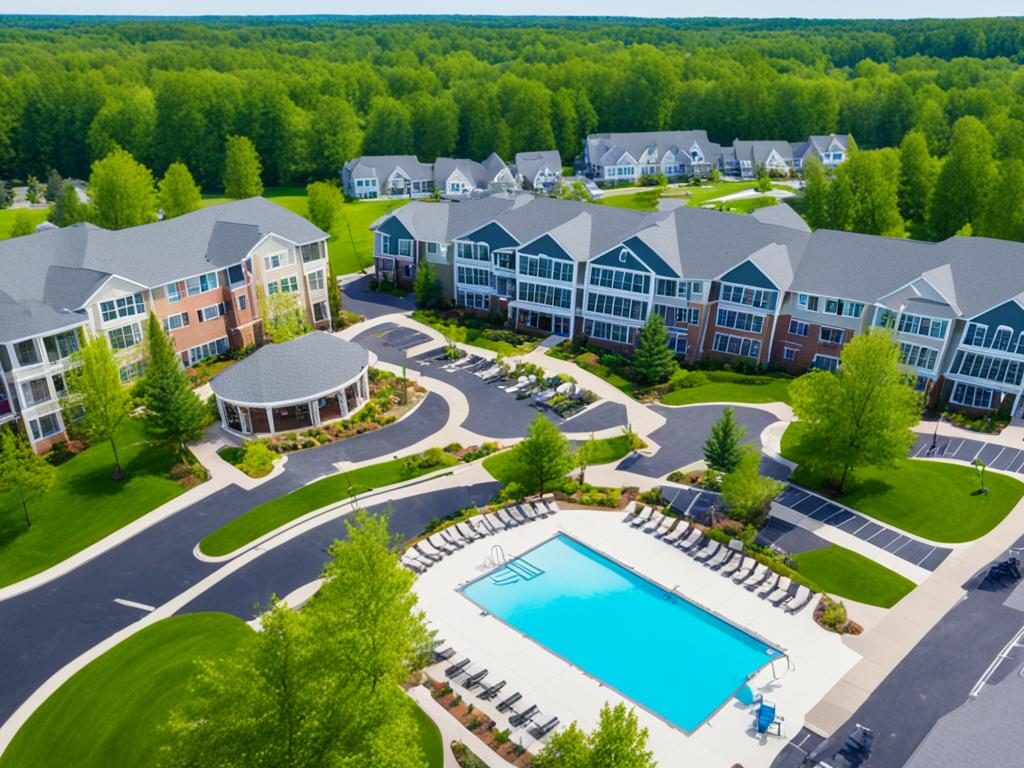 Planning for retirement involves many important decisions, and one of the most significant considerations is housing. As you envision your golden years, it’s crucial to explore the various housing options available to you and understand their costs and benefits. In this guide, we will provide expert advice and information on retirement housing options, helping you make informed choices that align with your needs and preferences.
Planning for retirement involves many important decisions, and one of the most significant considerations is housing. As you envision your golden years, it’s crucial to explore the various housing options available to you and understand their costs and benefits. In this guide, we will provide expert advice and information on retirement housing options, helping you make informed choices that align with your needs and preferences.
Whether you’re planning to downsize, stay in your current home, or explore retirement communities, understanding the implications of each choice is essential. By considering factors such as location, financial implications, lifestyle preferences, and healthcare needs, you can ensure that your housing decision in retirement supports a comfortable and fulfilling life.
Consulting with a financial advisor to assess your budget and discussing your vision for retirement housing with your partner can provide valuable insights and help you make the best choices. With careful planning and thorough research, you can create a housing strategy that brings peace of mind and enhances the quality of your retirement years.
Key Takeaways:
- Planning for retirement housing is an essential part of your overall retirement strategy.
- Discuss your vision and preferences with your partner to ensure alignment.
- Weigh the emotional attachment to your current home against the benefits of downsizing.
- Explore different retirement housing options, considering factors like location and amenities.
- Consult with a financial advisor to assess the financial implications of different choices.
Discuss Your Vision for Retirement Housing
When it comes to retirement housing, having a clear vision is key. Take the time to discuss your retirement plans with your partner to ensure you’re both on the same page. Consider factors such as location, whether you want to stay in your current home or downsize, and how housing fits into your overall financial plan. Consulting with a financial advisor will help you understand the financial implications of different housing choices. By aligning your retirement housing vision with your retirement planning and financial planning, you can make informed decisions that suit your needs and budget.
Start the Conversation
Begin by having an open and honest conversation with your partner about your retirement housing vision. Discuss your individual preferences and goals, and find common ground that works for both of you. It’s important to understand each other’s expectations and desires when it comes to where you want to live during retirement.
Consider asking questions such as:
- Do we want to stay in our current home or downsize?
- Are there specific amenities or features we desire in our retirement housing?
- What are our budgetary considerations?
By addressing these questions early on, you can lay a solid foundation for your retirement housing planning.
Retirement Planning and Housing
Retirement planning goes hand in hand with retirement housing. It’s essential to consider how your housing choices will affect your overall financial plan. Consult with a financial advisor to evaluate the financial implications of different housing options.
“Retirement planning involves assessing your current financial situation, estimating future expenses, and developing a strategy to ensure you have sufficient funds to support your desired lifestyle. When discussing retirement housing, it’s crucial to factor in the costs associated with various options and how they align with your retirement goals.” – John Smith, Certified Financial Planner
By incorporating retirement housing into your financial plan, you can make informed decisions that are sustainable in the long run.
| Factor | Consideration |
|---|---|
| Location | Do you want to live near family, in a warm climate, or close to amenities? |
| Current Home vs. Downsizing | Weigh the pros and cons of staying in your current home versus downsizing to a smaller property. |
| Financial Plan | How does your retirement housing choice fit into your financial goals and budget? |
| Future Needs | Consider potential health and mobility needs as you age. |
Having an open dialogue, considering key factors, and involving a financial advisor in your retirement housing vision and planning will set you on the right path towards a fulfilling retirement.
Downsizing vs. Staying in Your Current Home
Downsizing is a common consideration for retirees as it can lead to financial freedom and a simplified lifestyle. However, it’s important to weigh the emotional attachment to your current home against the benefits of downsizing.
Consider factors such as your home’s equity, affordability, medical and physical needs, home and yard maintenance, and potential feelings of loneliness or isolation. These factors can help you evaluate the financial implications and practicality of downsizing in retirement.
If you decide to downsize, you can free up equity from your current home that can contribute to your retirement savings. Additionally, downsizing often reduces home maintenance and utility costs. It can also provide an opportunity to move into a more senior-friendly space or community that offers amenities and services tailored to retirees.
On the other hand, staying in your current home may offer familiarity, comfort, and a deep sense of belonging. It allows you to maintain the social connections you’ve built over the years and stay in a neighborhood that you know and love.
“Home is where the heart is. It’s the place where memories are made and cherished. Sometimes, the intangible benefits of staying in your current home outweigh the financial advantages of downsizing.”
Before making a decision, it’s important to carefully consider your financial situation, your long-term needs, and your future goals. Consulting with a financial advisor can provide valuable insights into the financial implications of downsizing and help you make an informed decision. They can assist in assessing the potential impact on your retirement budget, investment portfolio, and overall financial wellness.
The Pros and Cons of Downsizing
When contemplating downsizing, it’s helpful to evaluate the potential advantages and disadvantages. Here are some key points to consider:
| Pros of Downsizing | Cons of Downsizing |
|---|---|
|
|
Understanding these pros and cons can help you evaluate how downsizing fits into your retirement plans and make a decision that aligns with your priorities and goals. Remember, the choice between downsizing and staying in your current home is personal and should be based on careful consideration of both financial and emotional factors.

Types of Retirement Living Options
When it comes to retirement living, there are various options available to cater to different needs and lifestyles. Understanding the features and costs of each option is crucial in making an informed choice. Let’s explore the different types of retirement living options:
Aging in Place
Aging in place allows older adults to remain in their current homes with necessary modifications and care services. It provides a sense of familiarity and independence while receiving the support needed to maintain a comfortable living environment.
Independent Living Retirement Communities
Independent living retirement communities offer an active and independent lifestyle for seniors. These communities provide various amenities and services, such as fitness centers, social activities, and convenient on-site resources, allowing residents to enjoy their retirement years to the fullest.
Continuing Care Retirement Communities (CCRCs)
Continuing care retirement communities are designed to provide a continuum of care as individuals age. They offer a range of housing options, from independent living to assisted living and skilled nursing. This allows retirees to transition smoothly between different levels of care as their needs change over time.
Assisted Living Retirement Communities
Assisted living retirement communities are ideal for seniors who desire an independent lifestyle but may require some assistance with everyday tasks. These communities provide support with activities of daily living, such as meal preparation, medication management, and personal care, while still promoting independence and social engagement.
Nursing Homes
Nursing homes are residential facilities that offer comprehensive care for older adults with higher medical needs. They provide around-the-clock skilled nursing care, rehabilitation services, and assistance with daily activities for individuals who require more intensive support and medical attention.
| Retirement Living Option | Features | Costs |
|---|---|---|
| Aging in Place | – Adaptations in the current home – Access to home care services |
– Modifications cost – Cost of supportive services |
| Independent Living Retirement Communities | – Various amenities and activities – Maintenance-free living |
– Rental or ownership costs – Monthly community fees |
| Continuing Care Retirement Communities (CCRCs) | – Independent living options – Assisted living services – Skilled nursing care – Social and recreational activities |
– Entrance fees – Monthly fees – additional costs for care services |
| Assisted Living Retirement Communities | – Personalized assistance – Social and recreational activities – Meal services |
– Monthly rent or fees – Additional costs for specialized care |
| Nursing Homes | – Skilled nursing care – Rehabilitation services – 24/7 care and supervision |
– Monthly fees – Cost of medical services |
Each retirement living option has its unique advantages, and the choice depends on individual preferences, needs, and financial considerations. It’s important to carefully evaluate the options available and consult with professionals to determine the best fit for your retirement lifestyle.
Conclusion
As you reach the point of making retirement housing decisions, it’s vital to carefully consider your options and plan for the future. Start by assessing your current real estate portfolio, including any homes or properties you own. Next, think deeply about your priorities for retirement – where and how you want to live during your golden years. Take the time to weigh the pros and cons of downsizing, considering both the financial implications and emotional attachment to your current home.
Exploring retirement-friendly communities is another important step in your decision-making process. These communities offer a range of amenities and services tailored specifically to retirees, promoting an active and fulfilling lifestyle. By evaluating these factors and consulting with professionals such as financial advisors and real estate agents, you can gain valuable insights and guidance to help you make informed decisions.
Remember, planning for retirement housing is a significant life transition, and it’s crucial to approach it with care and thoroughness. Take the time to gather all the necessary information, weigh your options, and make choices that align with your vision for a secure and enjoyable retirement. By doing so, you’ll be well on your way to finding the perfect housing option that allows you to live out your retirement years to the fullest.
FAQ
What are some retirement housing options to consider?
There are several types of retirement living options to consider, including aging in place, independent living retirement communities, continuing care retirement communities, assisted living retirement communities, and nursing homes. Each option caters to different needs and lifestyles.
Why is it important to discuss retirement housing vision with a partner?
Discussing your retirement housing vision with your partner is crucial to ensure you are on the same page. It allows both partners to have a say in the decision-making process and ensures that the chosen housing option aligns with both of your preferences and needs.
What factors should I consider when deciding whether to downsize or stay in my current home?
When deciding whether to downsize or stay in your current home, you should consider factors such as your home’s equity, affordability, medical and physical needs, home and yard maintenance, and potential feelings of loneliness or isolation. It’s important to weigh the emotional attachment to your current home against the benefits of downsizing.
What services do continuing care retirement communities provide?
Continuing care retirement communities provide a continuum of care, starting from independent living and progressing to assisted living and skilled nursing. These communities offer a range of services to cater to different stages of aging and changing needs.
How should I approach making retirement housing decisions?
When making retirement housing decisions, it’s important to assess your current real estate portfolio, consider your priorities for retirement, weigh the pros and cons of downsizing, and explore retirement-friendly communities. Consulting with professionals, such as financial advisors, can also help guide you in making informed choices.

